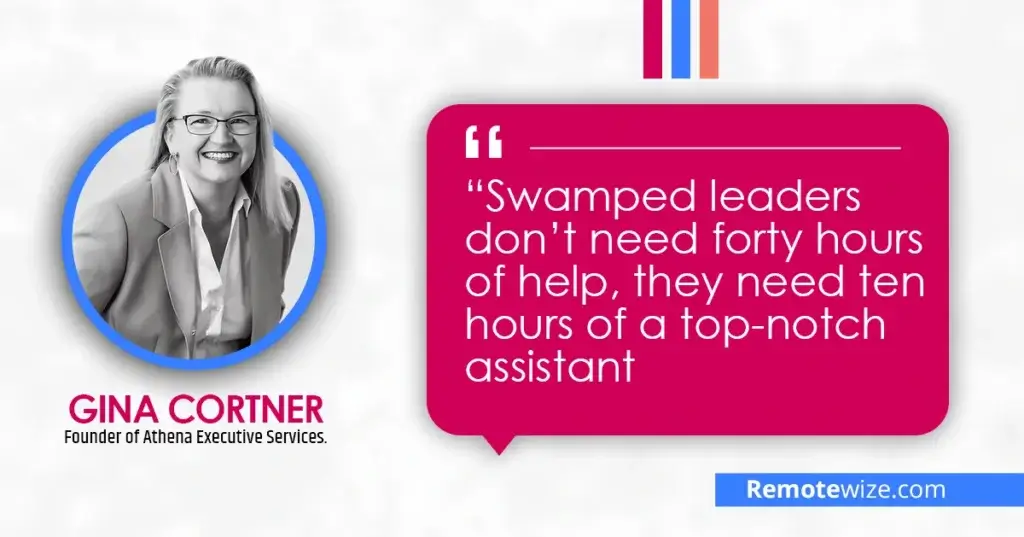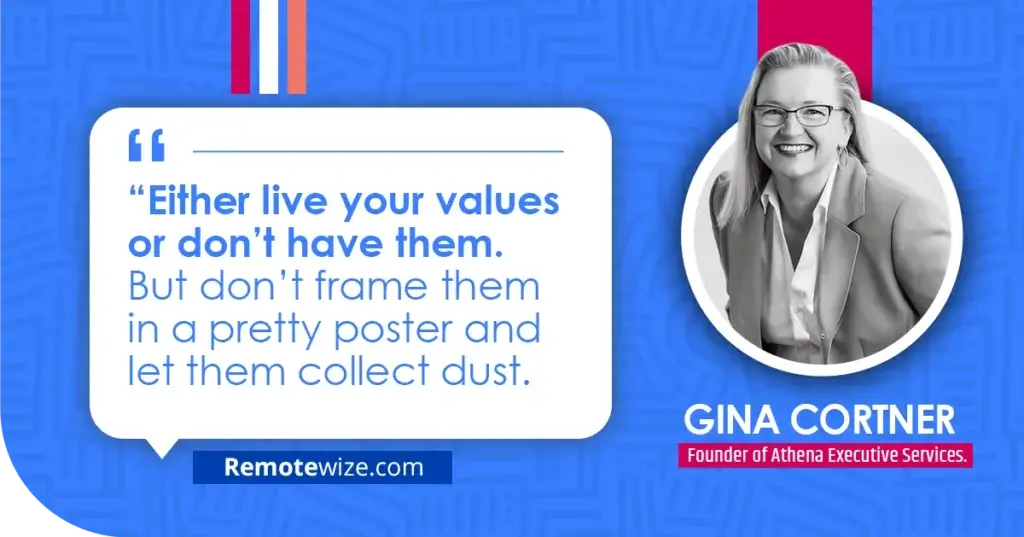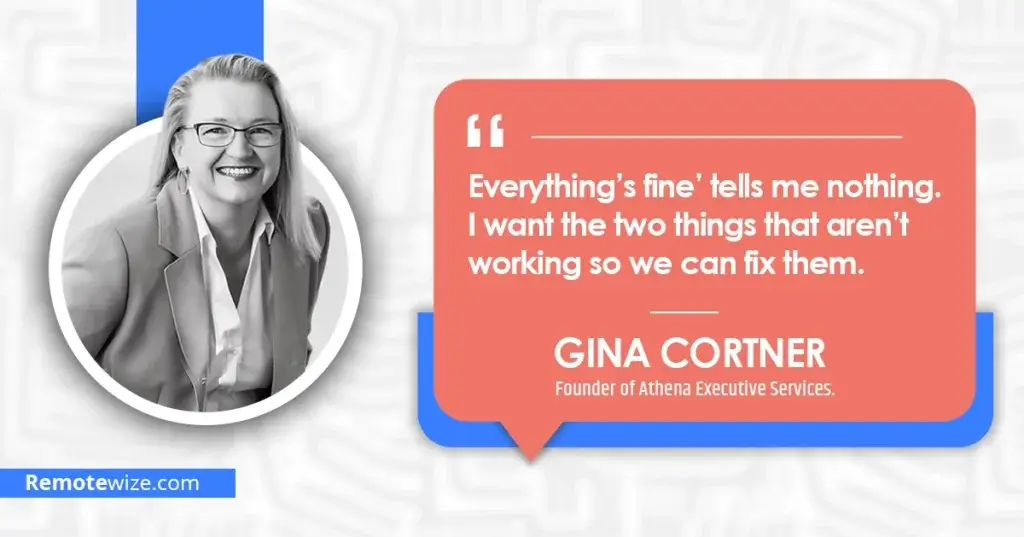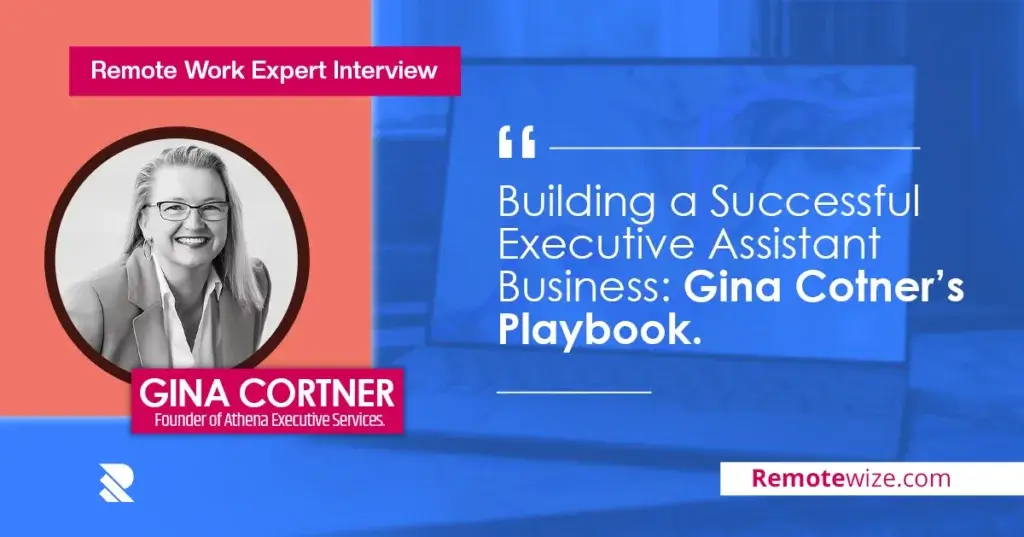If you’re building a virtual assistant business (or even just thinking about it) you’ve probably faced a familiar tangle of questions.
How do you stand out in a crowded market?
What does scaling actually look like without losing that personal touch?
And how do you build trust with clients who may never meet you face to face?
I had those same questions. So I reached out to someone who has lived through every stage of the journey: Gina Cotner, founder of Athena Executive Services.
Gina started off as a solo virtual assistant and has grown Athena into a fully remote team of 25 executive assistants (EAs), all based in the United States. In our conversation, she walked me through how she built a business that’s scalable, genuinely human, and prioritizes people, process, and long-term client relationships over quick wins or busywork.
In this piece, I’ll break down the key lessons Gina shared about building a culture that scales with your team.
Early Days of Remote Work at Athena
Athena’s story doesn’t begin with a big pitch deck or venture funding. It started when Gina’s boss decided to give up their office lease. Everyone just kept working from home and it worked so well that Gina never looked back. Gina shares,
“When the building lease ended, we all just worked from home, and I never looked back. An office simply never entered the business plan.”
Athena was built to be remote from day one. And while remote work is common now, in 2016 it was still a fringe idea for many. Gina leaned in anyway. Her second bold move? Hiring only U.S.–based executive assistants.
She further adds, “Swamped leaders don’t need forty hours of help, they need ten hours of a top-notch assistant.”

That high-quality, low-hours model set Athena apart, and still does.
Evolution of Systems for Scaling
In the early days, Gina ran everything manually. Invoicing was a Word document. Payroll lived in a spreadsheet. Client onboarding happened through long email chains.
As demand grew, those systems started to break. But instead of panicking, Gina saw it as a sign of progress. She says, “Every time we grow, a system breaks. That isn’t a crisis, it’s a sign we’ve outgrown Version 1 and need Version 2.”
Today, Athena runs on a much more streamlined foundation. They use QuickBooks for invoicing, Gusto for payroll, and templatized onboarding flows to keep everything consistent. But no matter your stage, there are a few core systems worth investing in early.
- A time-tracking and invoicing setup like Harvest or FreshBooks, can save hours of admin work each month.
- For payroll and compliance, tools like Gusto, Deel, or Remote help navigate taxes and cross-border payments.
- And if you’re onboarding new clients or assistants regularly, using a workflow tool like Notion, ClickUp, or Trello keeps everyone aligned from day one.
And since communication is the glue that holds remote operations together, don’t miss this guide on the benefits of effective team communication in remote workplaces.
It’s a useful breakdown of how communication systems can directly impact performance and retention in distributed teams.
Winning Strategies for Executive Assistant Businesses
What sets a successful executive assistant business apart is the systems, the hiring approach, and the emphasis on real connection.
The most sustainable models focus on clarity, consistency, and trust. Let’s take a closer look at the strategies behind building a business that lasts.
Hire for Culture Add, Not Just Culture Fit
Many teams default to hiring people who blend in easily, same background, same communication style, same everything. But that often leads to sameness, not strength. The real wins come when you look for culture add instead of just culture fit. That means hiring people who align with your values but also stretch the team in new directions.
Athena takes that seriously. Their two-week screening process includes multiple phone calls, hands-on tasks, and conversations around working styles.
Candidates aren’t picked for personality alone, they’re evaluated on how they ask follow-ups, how they handle ambiguity, and whether they’d thrive in the team’s rhythm.
To go deeper into this mindset, check out our conversation with culture strategist Anu Mandapati on rethinking remote culture (anchor text)
Building and Maintaining a Culture People Love
Culture isn’t the perks or branding, it’s how people treat each other when no one’s watching. In a remote setup, where face time is limited, culture needs to be intentional. It shapes how people collaborate, ask for help, take breaks, and celebrate wins.
A strong culture creates psychological safety. It’s what makes people speak up, stick around, and show up fully even when things get hard. Without it, remote teams drift into silence, miscommunication, or quiet burnout.
Athena keeps culture front and center through small, consistent actions. Think optional book clubs, monthly team huddles, and norms that prioritize rest. As Gina puts it:
“Either live your values or don’t have them. But don’t frame them in a pretty poster and let them collect dust.”

That includes rejecting hustle culture when needed.
“A sick person writing one more email is a recipe for a bad email. We’d rather you tell the truth, log off, and get well.”
Those habits add up, and over time, they build a place people actually want to stay.
Ensure New Members Understand the Culture
Culture isn’t something new hires should be handed in a PDF. It needs to show up in every step of how someone joins your team. That early exposure sets the tone for how they work, ask for help, and show up under pressure.
Athena builds that into the hiring process itself. Candidates are tested on how they communicate across platforms, how they deal with missing information, and whether they follow up without being asked. It’s a preview of what real client work looks like.
Once someone joins, they’re paired with a performance coach who checks in regularly. That ongoing support helps new team members feel confident before they’re expected to perform. As Gina puts it, “We don’t want people just ‘getting through’ the first few weeks. We want them feeling supported and ready.”
Maintain Human Connection in Your Team
Remote work runs on efficiency, but that can’t come at the cost of connection. When people don’t feel seen, they stop showing up with the same energy. And in a remote team, that silence can spread fast.
Human connection doesn’t need to be complicated. It just needs to be consistent. Gina says, “Software is great, but twice a week you still have to ask, ‘How was your weekend?’ Because whatever happened at home walks into work with that person.”
At Athena, managers have one-on-ones that go beyond project updates. They’re looking for signs of burnout, disengagement, or friction, long before it shows up in a missed deadline. It’s not just about being nice. It’s about building a team that lasts.
Build Trust Between EA and Clients
Executive assistant work is built on trust. Without it, tasks fall through, updates get vague, and both sides get frustrated. That kind of trust doesn’t just appear, it needs to be designed into the relationship.
Athena does this from day one. Clients meet their assistant before any contract is signed. That’s followed by daily stand-ups, a check-in from a client-care manager in week three, and a scope review in week four. Gina admits it’s not the fastest way to onboard, but it works: “Before anyone signs, the client actually meets their EA. It’s risky, we could lose the sale, but the right chemistry up front saves headaches later.”
By structuring trust into the process, not just hoping it happens, Athena gives both sides the confidence to work better, faster, and with less stress.
Manage EA Workload and Delegation
One of the biggest risks in assistant-client dynamics is scope creep. Without clear expectations, assistants end up juggling dozens of requests without a clear plan, and clients wonder why things fall through.
Assistants at Athena are encouraged to organize tasks by priority and timeline. Gina puts it simply: “Give me a hundred tasks, that’s fine. I’ll just tell you which three land this week, which five next week, and which one next month.”
If a client continues to overload, the client-care team steps in. It’s not about pushing back, it’s about helping both sides understand what’s realistic, what’s urgent, and what can wait.
Turn Feedback into Action
Most companies treat feedback as something you collect when something goes wrong. Athena sees it differently. Feedback is ongoing, proactive, and designed to help people grow, not feel judged.
Every client gets check-ins during the first 90 days. EAs work closely with performance coaches who translate that feedback into real conversations and next steps. Gina says, “Everything’s fine’ tells me nothing. I want the two things that aren’t working so we can fix them.”

If an issue is flagged, coaches don’t dump it on the assistant. They unpack it together, ask questions, and work toward a solution that builds confidence instead of resentment. It’s not a blame game, it’s a development loop.
Advice for Starting a Virtual Assistant Business
Before we wrapped up, I asked Gina what advice she’d give someone looking to start a virtual assistant business from scratch. Her answers were short, sharp, and 100 percent real.
If you’re thinking about starting a virtual assistant business, the playbook is surprisingly straightforward, but easy to overlook in the rush to grow.
Write things down before you need them. From onboarding checklists to sales scripts, clarity compounds.
Don’t sell time. Sell outcomes. Clients don’t care how many hours you spent—they care what moved forward.
And when systems break, don’t panic. That’s your signal it’s time to evolve.
As Gina puts it, “Follow that playbook and you don’t just build a business. You build a culture clients are happy to pay for, and people are proud to work in.”
Because the goal isn’t just to stay afloat. It’s to create something worth showing up for, again and again. Something that works whether you’re in the room or halfway across the world.
The best remote businesses aren’t built on hustle. They’re built on trust, process, and people who care enough to do it right.




